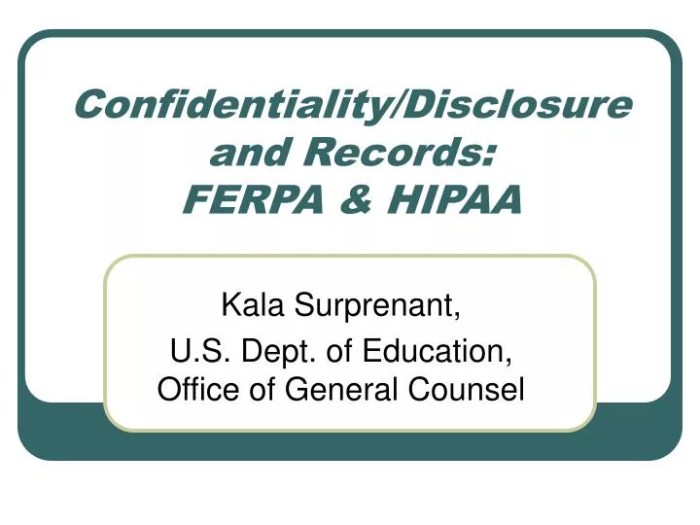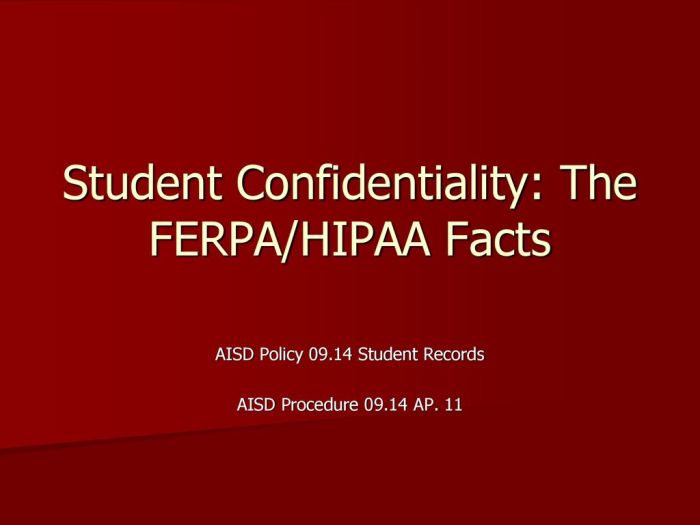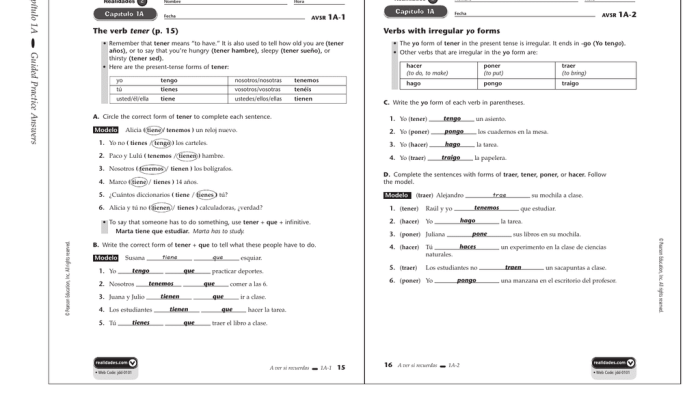The FERPA Confidentiality of Records Quiz is an essential tool for understanding the Family Educational Rights and Privacy Act (FERPA) and its implications for educational institutions. This quiz provides a comprehensive overview of FERPA’s provisions, responsibilities, and exceptions, ensuring compliance and protecting student privacy.
FERPA safeguards the privacy of student educational records, empowering students and parents with rights to access, amend, and control the release of their information. Educational institutions have a legal obligation to comply with FERPA, which includes obtaining consent for record release and adhering to specific exceptions.
FERPA Confidentiality of Records Overview
The Family Educational Rights and Privacy Act (FERPA) is a federal law that protects the privacy of student education records. It was enacted in 1974 and has been amended several times since then.
FERPA applies to all educational institutions that receive federal funding. These institutions are required to protect the privacy of student records and to provide students and parents with certain rights regarding those records.
Types of Student Records Protected Under FERPA, Ferpa confidentiality of records quiz
- Academic records, such as transcripts and grade reports
- Financial records, such as financial aid applications and award letters
- Disciplinary records, such as suspensions and expulsions
- Medical records, such as immunization records and health histories
- Counseling records, such as notes from counseling sessions
Rights of Students and Parents Under FERPA
- The right to inspect and review their education records
- The right to request that their education records be amended
- The right to have their education records transferred to another educational institution
- The right to prevent their education records from being released to third parties without their consent
FERPA Compliance for Educational Institutions

Educational institutions are responsible for complying with FERPA by protecting the privacy of student records and by providing students and parents with their rights under the law.
Obtaining Consent for the Release of Student Records
Educational institutions must obtain consent from students or their parents before releasing their education records to third parties. This consent must be in writing and must specify the records that are being released and the purpose of the release.
Exceptions to FERPA’s Confidentiality Requirements
There are a few exceptions to FERPA’s confidentiality requirements. These exceptions include:
- When the records are requested by the student or their parent
- When the records are requested by another educational institution to which the student is transferring
- When the records are requested by a government agency for the purpose of conducting a study or investigation
- When the records are released in connection with a judicial proceeding
FERPA and Technology

Technology has a significant impact on FERPA compliance. Educational institutions must take steps to protect the privacy of student records when using technology.
Challenges of Protecting Student Records in a Digital Age
There are a number of challenges to protecting student records in a digital age. These challenges include:
- The ease with which student records can be shared electronically
- The risk of data breaches
- The difficulty of tracking who has accessed student records
Guidance on Using Technology While Adhering to FERPA Regulations
Educational institutions can use technology to improve their FERPA compliance by:
- Using secure systems to store and transmit student records
- Restricting access to student records to authorized personnel only
- Training staff on FERPA compliance
FERPA Enforcement and Penalties

FERPA is enforced by the U.S. Department of Education. The Department can investigate complaints of FERPA violations and take enforcement action, such as:
- Issuing fines
- Withholding federal funding
- Terminating federal recognition
Potential Penalties for Non-Compliance
Educational institutions that violate FERPA can face significant penalties. These penalties can include:
- Fines of up to $50,000 per violation
- Withholding of federal funding
- Termination of federal recognition
Guidance on How to Avoid FERPA Violations
Educational institutions can avoid FERPA violations by:
- Developing and implementing a FERPA compliance plan
- Training staff on FERPA compliance
- Monitoring access to student records
- Responding promptly to requests for access to student records
Helpful Answers: Ferpa Confidentiality Of Records Quiz
What are the main provisions of FERPA?
FERPA protects the privacy of student educational records, grants students and parents rights to access and amend those records, and requires educational institutions to obtain consent for the release of records.
What are the responsibilities of educational institutions under FERPA?
Educational institutions must comply with FERPA by implementing policies and procedures to protect student records, obtaining consent for record release, and adhering to exceptions.
How does technology impact FERPA compliance?
Technology can facilitate FERPA compliance by automating processes and providing secure storage for records. However, it also poses challenges, such as the need to protect records from unauthorized access and cyberattacks.
